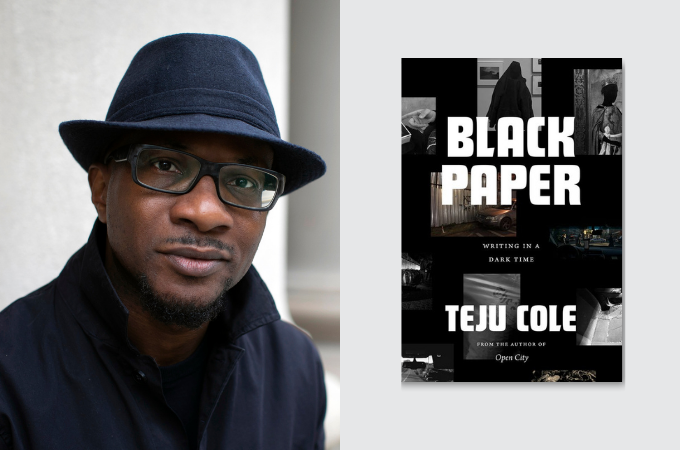
Exciting new for Teju Cole’s fans! In a single year, the author and photographer has finalized two full-length projects. Barely a month since we announced the forthcoming release of Cole’s seventh book, the author has announced an eighth one.
The new book Black Paper takes its title from a 2017 photo exhibition that Cole held in New York, courtesy of Performa. It is his second full-length essay collection following Known and Strange Things (2016). The collection is divided into five thematically-linked parts, titled After Caravaggio, Elegies, Shadows, Coming to Our Senses, and In a Dark Times. The twenty-five essays in the collection are linked by “ethical questions about what it means to be human and what it means to bear witness, recognizing how our individual present is informed by a collective past.”
Black Paper is set for publication in October 2021 by the University of Chicago Press, in e-book, as well as paperback.
If you’d like to pre-order Black Paper, follow this link. Here is a description by the publishers below:
”A wide-ranging collection of essays from a celebrated master of the form.
“Darkness is not empty,” writes Teju Cole in Black Paper, a collection of essays that meditate on what it means to keep our humanity—and witness the humanity of others—in a time of darkness. Cole is well-known as a master of the essay form, and in Black Paper he is writing at the peak of his skill, as he models how to be closely attentive to experience—to not just see and take in, but to think critically about what we are seeing and not seeing.
Wide-ranging in their subject matter, the essays are connected by ethical questions about what it means to be human and what it means to bear witness, recognizing how our individual present is informed by a collective past. Cole’s writings in Black Paper approach the fractured moment of our history through a constellation of interrelated concerns: confrontation with unsettling art, elegies both public and private, the defense of writing in a time of political upheaval, the role of the color black in the visual arts, the use of shadow in photography, and the links between literature and activism. Throughout, Cole gives us intriguing new ways of thinking about the color black and its numerous connotations. As he describes the carbon copy process in his epilogue: “Writing on the top white sheet would transfer the carbon from the black paper onto the bottom white. Black transported the meaning.”









COMMENTS -
Reader Interactions